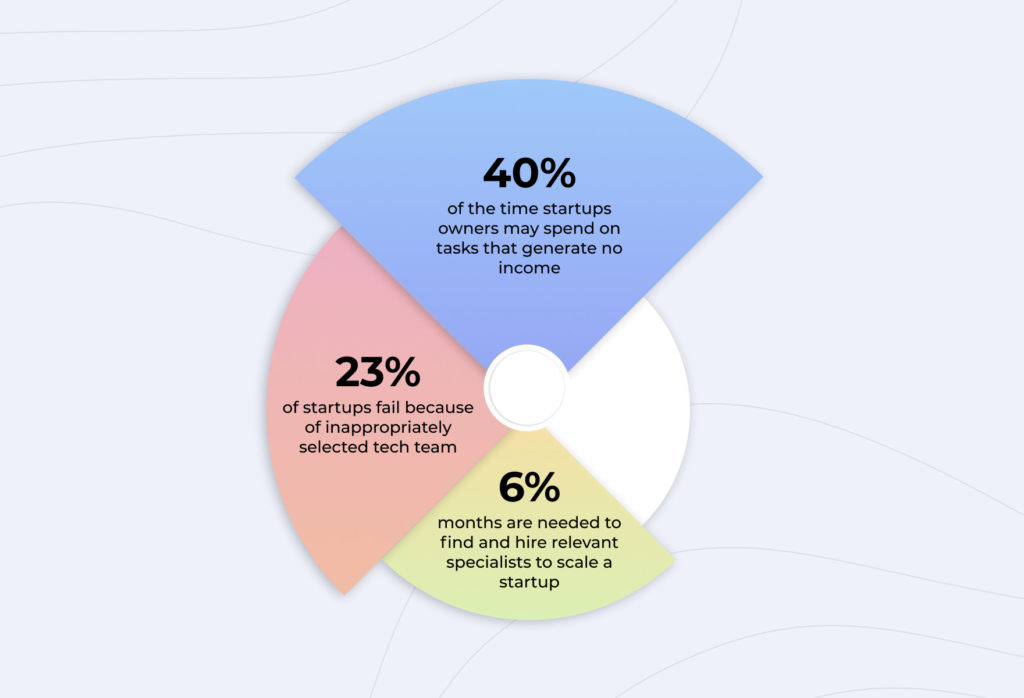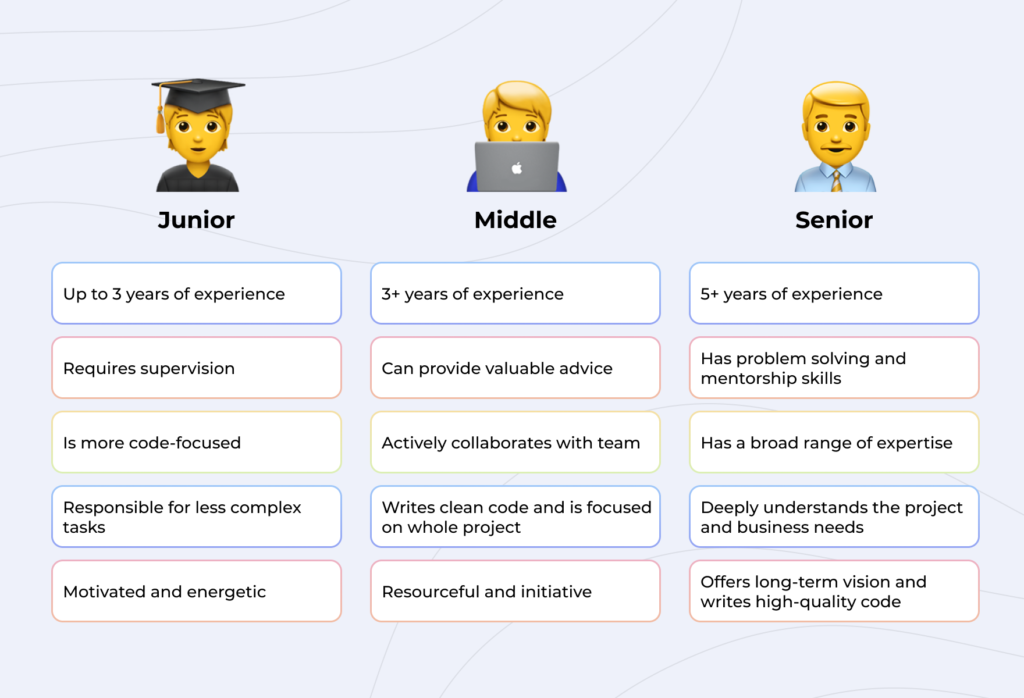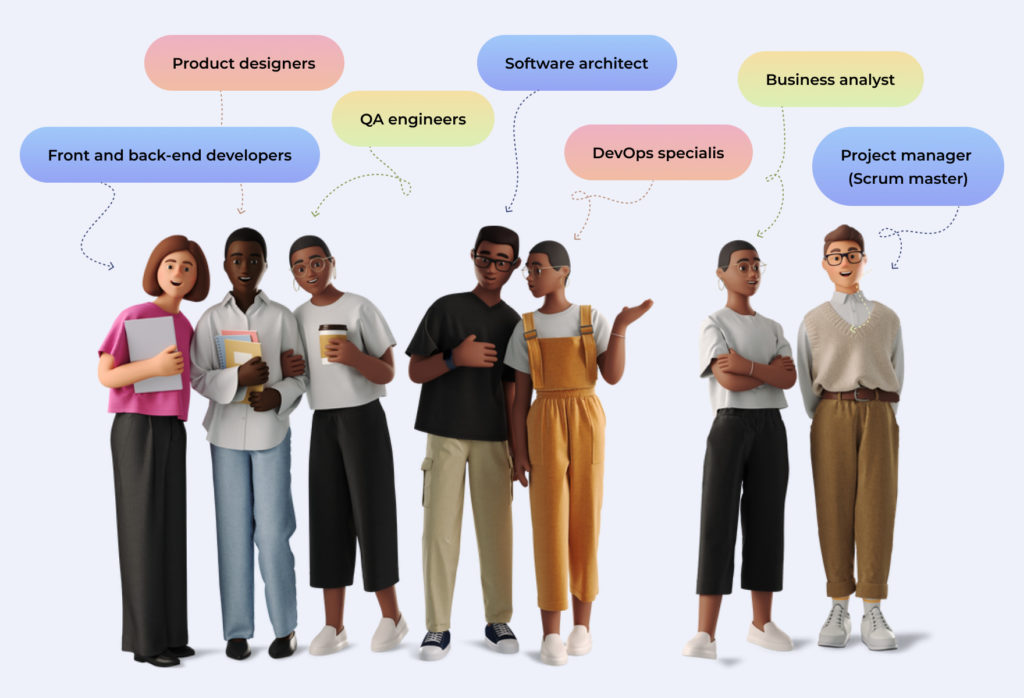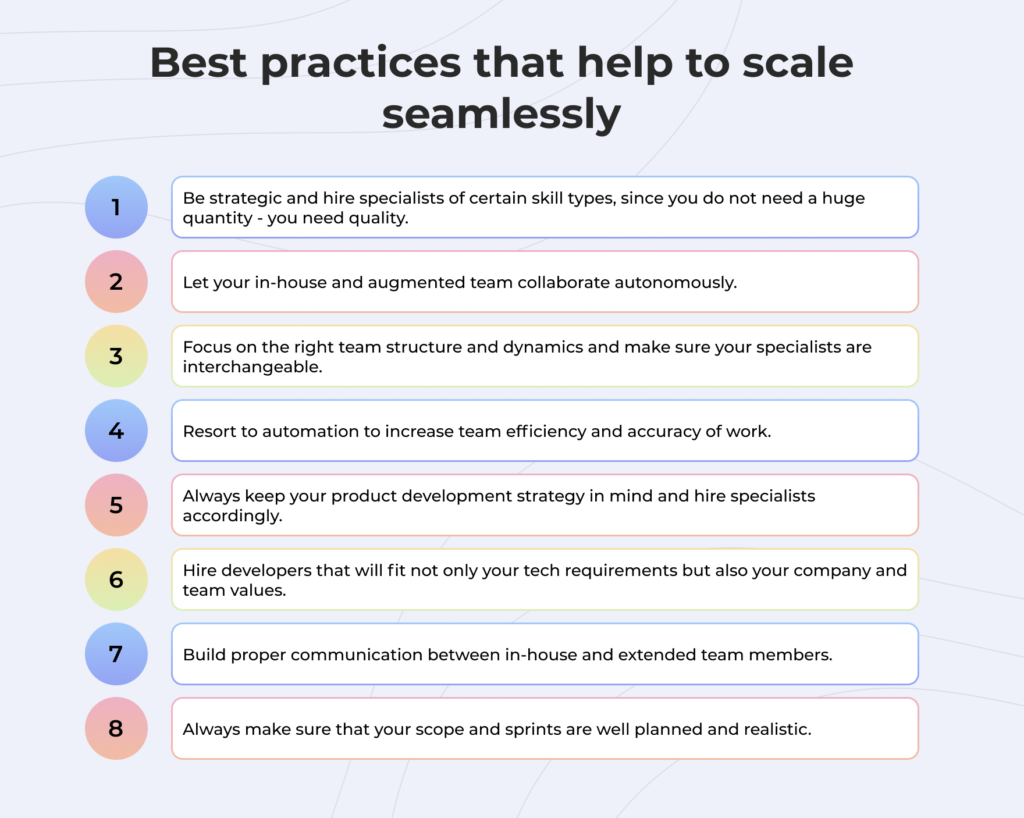Table of Contents

So in order to help you with proper scaling, we decided to write an article that will point out the right direction for you. We will cover what team composition and seniority is the best, and also we will provide some great tips. So, without further ado, let’s proceed.
Key concepts that seniority implies
Before starting software development many startup owners tend to organize small teams of in-house specialists. But with time their projects transform and it turns out that they require additional tech experts, and that’s when many troubles begin.
The thing is that in many cases startups lack certain expertise or skills, and the founders think that the gap can be effectively covered if they hire expensive senior specialists. Well, that approach is not the best for sure. To prove our point and help you understand seniority better, we’d like to talk about concepts that define it first.
#1 Job titles
The job title is what defines a certain position in a development team. Iа you take a look at our team you will discover that we have a bunch of specialists such as business analysts, software architects, web and mobile developers, front-end coders, designers, QA specialists, DevOps, and even marketing experts. Job titles help to differentiate what each specialist does, however they do not necessarily point out specialists seniority.
#2 Skill sets
Skill sets help software vendors and their clients identify the expertise and seniority of each specialist. The more skills the technician has, the more experienced and valuable a team member he or she can be. Team members with many soft and hard skills can take on more responsibilities and integrate easily into your in-house team. On top of that, they often deeply specialize in specific domains and can contribute greatly to your project.
#3 Project roles
In product development teams, all technicians have certain roles that define the spectrum of tasks and spheres of responsibility. Clearly-defined project roles help technicians understand what expectations are placed on them and what scope of work they are supposed to complete.
For example, senior specialists can be responsible for coding and, at the same time, have management responsibilities. So they can supervise the work of middle and junior devs, perform code reviews, etc.
Three main seniority levels in a development team
In the developing world, there is a strict hierarchy of seniority levels. In most companies, you will find junior devs, mid-level specialists, and senior developers. All software engineers are divided into these groups according to their proficiency, skills, industry knowledge, and leadership qualities.
Take a look at these infographics demonstrating how juniors, middles, and senior devs differ, and then we’ll talk about each of those specialists in detail:

Tech skills and duties of junior developers
Junior developers often have a decent set of skills, however, they are focused on writing code and not giving much attention to the business industry or the bigger picture of the development process.
The services of junior developers cost less compared to the other two types of software engineers. But this does not mean you need to overload your team with juniors to optimize costs.
Juniors can write great code, but they will not be active participants in project discussions. They will not delve into the business side of all your processes and will require mentorship. Such specialists are hard-working and goal-oriented, but you should know that their work will require additional reviews from a tech lead or senior developer.
Junior developers can work with frequently used APIs, popular frameworks, databases, and programming languages. They can work in a team and contribute to your project.
What to expect from Middle specialists
Middle developers have more senior level than juniors; they possess more knowledge and skills, master more tools, and often demonstrate a pretty deep understanding of a business niche. Middle devs can work more independently than juniors, provide valuable feedback, and even give their less qualified teammates professional advice.
Middle specialists are considered a golden means of every development team as they are very productive, motivated, and tech-savvy. They understand functional programming and how to implement features and integrations into solutions of different complexity.
Responsibilities of a Senior developer and Tech lead
The senior position implies a lot of responsibilities and mentorship. That is why the services of team leaders and senior devs are so expensive. By hiring such a specialist with broad knowledge of technologies, and the ability to work with the advanced technology stack, you get a real engineering leader who can turn your project to a whole new level.
A senior developer is a valuable member of every tech team who can write high-quality code, suggest new ideas, manage junior developers, and provide necessary feedback. All key responsibility lies on their shoulders, and these team leaders find the best ways to solve a problem and drive innovative approaches.
How to achieve perfect team composition for a scaling startup
Now when you know what skills and responsibilities the developers of different seniority can offer you, you may be wondering how exactly to scale your development team. Well, to achieve the best results in the long run, we would recommend you follow several crucial steps while building teams.
To begin with, you need to measure the performance of your existing team members and understand what specialists you lack to build the desired solution for your business. The performance of the team can be identified on several different levels.
For example, you can measure the quality of code your specialists write and the number of features implemented during one sprint. Based on this information, you can identify your demand – how many specialists you require, what seniority, and for what period.
The second piece of advice is to be flexible. The thing is that your team cannot stay the same during the project. Yes, you may have a perfect team of ten people who can build software from scratch, but they all may lack at least one senior specialist, or tech lead to be more productive. Your team should also change when your project grows and becomes more complex.
Based on our experience, we can say that it is crucial to have one or two senior developers, and the rest of the team can be filled with mid-level and junior developers. We observe how in many cases, startups keep going to extremes. They either invest a lot of money into too many senior coders or too many juniors.
As a result, they lose a great deal of budget in the first case, and in the second case, they lose a lot of time and compromise software quality. You need to find a perfect balance and not be afraid to mix specialists.
It is normal to cover your gaps with junior specialists. But if you do this, make sure you have:

Most scaling startups suffer because they hired wrong specialists who cannot integrate in the team and produce instant results. But this all happens because you probably hired an imbalance team.
For example, you have too many junior developers but not enough seniors who can perform additional code testing and reviews. Or maybe you have too many senior specialists focused on serious tasks and missing the small details that result in delays. A perfect cohesive team should have the following specialists of different seniority:
A critical piece of advice we’d like to give you is that you do not need to be afraid of diversity. Junior specialists, as well as middle and senior ones, can contribute significantly to your project. You should not focus on other startups, as your case can be unique. So it is better to consult with real professionals like the Altamira team.
You can get valuable insights regarding your team’s scaling and composition by requesting a free consultation. We can help you with technical documentation, suggest project transfer plans and onboarding strategies, and select specialists that will fit your team.

Altamira tips on choosing the right developers and integrating them in your scaling team
Since our software development company helped many startups to scale and build high-quality business solutions, we want to share ideas and tips with you. They will help you to make hiring and onboarding of new developers much easier.
The first tip would be to define product strategy upfront. The scaling procedure should follow your strategy, goals and mission. If you do not have a clear strategy, you may end up losing a lot of time and getting wrong specialists.
While hiring, pay close attention to the industry expertise of your vendor. Check out the company portfolio, read reviews left by their clients, and jump on calls with their managers to find out what this company is skilled at and what business industries they’ve built solutions for. It is also a good idea to ask vendors about their values, development approach and risk mitigation strategies that they can provide.
Highly experienced vendors always offer a full range of development services that growing startups can benefit from. For example, here at Altamira, we provide three extra services such as:
Discovery stage
We help to conduct holistic market research, estimate your project, write all technical documentation, and suggest the most suitable tech stack and team composition for further development.
MVP development
Together with our team you can build and launch MVP in 100 days to validate your hypothesis, test out the idea and market, and gather valuable feedback of your target audience.
Team scaling
Enrich your in-house team by hiring additional specialists at Altamira. We have 120+ developers of different qualifications and seniority able to build industry-specific solutions.
Your vendor should offer a perfect balance between cost efficiency and quality. So before suggesting you any senior or mid level specialists, the reliable vendor will try to understand your project needs, discover what kind of knowledge and responsibility your team lacks. And only then the vendor will help you hire people that will be a perfect fit for your project.
Once you’ve selected your technical partner and got all necessary developers, you need to introduce and onboard new employees. This is a serious process that defines the future success of your project.
So make sure that new developers get enough information about the project, can delve into technical documentation and communicate easily with all your current team members. Communication is also the key to success, so try to optimize all your communication channels and use the most efficient tools for project management like Slack, Jira, Confluence or else.
As to the scope of work, try not to make too long sprints and divide the work into smaller parts. In such a way it will be easy to detect any issues and fix them on the go without affecting the quality of all projects and deadlines set for your teams.
To get more tips on team organization, check out this blog post that is dedicated to selection of team structure, setting clear goals, and establishing effective communication during the development process.
Wrapping up
These days it has become easier than ever to turn ideas into real projects. But sooner or later even the most successful startups face the necessity to scale, extend their small teams and achieve business growth. And there is no better way to scale up effectively than by benefiting from outsourcing services provided by vendors like Altamira.
We know firsthand that to develop the best solution able to satisfy all your customers, you do not necessarily need to hire only senior specialists.
All you need is a right team that includes developers of different seniority, who will help you to organize all processes and perform proper project management. In case you are still looking for such a team, we are here to help you. Together with Altamira you can scale efficiently and build a long-lasting tech partnership.



